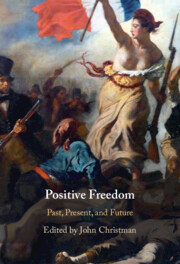Book contents
- Positive Freedom
- Positive Freedom
- Copyright page
- Contents
- Contributors
- Acknowledgments
- Introduction The Multiple Dimensions of Positive Freedom
- Chapter 1 Unity and Disunity in the Positive Tradition
- Chapter 2 Positive Liberty as Realizing the Essence of Man
- Chapter 3 Moral and Personal Positive Freedom
- Chapter 4 Positive Freedom and Freedom of Contract
- Chapter 5 Recognition and Positive Freedom
- Chapter 6 Self-Mastery and the Quality of a Life
- Chapter 7 Basic Freedom in the Real World
- Chapter 8 Reframing Democracy with Positive Freedom
- Chapter 9 Disability and Positive Liberty
- Chapter 10 Positive Freedom and Paternalism
- Chapter 11 Beyond Positive and Negative Liberty
- Chapter 12 Property and Political Power
- Chapter 13 Public Reason, Positive Liberty, and Legitimacy
- Works Cited
- Index
Chapter 13 - Public Reason, Positive Liberty, and Legitimacy
Published online by Cambridge University Press: 03 September 2021
- Positive Freedom
- Positive Freedom
- Copyright page
- Contents
- Contributors
- Acknowledgments
- Introduction The Multiple Dimensions of Positive Freedom
- Chapter 1 Unity and Disunity in the Positive Tradition
- Chapter 2 Positive Liberty as Realizing the Essence of Man
- Chapter 3 Moral and Personal Positive Freedom
- Chapter 4 Positive Freedom and Freedom of Contract
- Chapter 5 Recognition and Positive Freedom
- Chapter 6 Self-Mastery and the Quality of a Life
- Chapter 7 Basic Freedom in the Real World
- Chapter 8 Reframing Democracy with Positive Freedom
- Chapter 9 Disability and Positive Liberty
- Chapter 10 Positive Freedom and Paternalism
- Chapter 11 Beyond Positive and Negative Liberty
- Chapter 12 Property and Political Power
- Chapter 13 Public Reason, Positive Liberty, and Legitimacy
- Works Cited
- Index
Summary
Public reason approaches to political legitimacy typically claim that members of society are free and equal when they live under institutions that are publically justified. Institutions are publically justified when they can be justified in the right way to the reasoning of each member. However, the requirements of publically justified institutions are also backed by political coercion or other social practices through which individuals are held accountable to those requirements, though the result is supposedly citizens being free in a positive sense. Throughout this development, public reason theorists have seemed to presume that legitimate institutions are sufficient for securing the freedom of its members, even the members that do not think those institutions are best. This change from best to merely legitimate, however, raises serious difficulties for the account of freedom within public reason theories, particularly when we consider the level of divergence that may exist between the institutions favored by one’s own reason and the merely legitimate institutions one may live under. This chapter elaborates the difficulties that public reason views face regarding liberty in a merely legitimate regime, and considers the main strategies available to such accounts for understanding the liberty of members of legitimate societies.
- Type
- Chapter
- Information
- Positive FreedomPast, Present, and Future, pp. 236 - 254Publisher: Cambridge University PressPrint publication year: 2021

